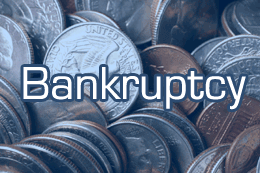Albany
New York Bankrupcy Lawyer Alan R. LeCours
Bankruptcy defined by Law.com
n. a federal system of statutes and courts which
permits persons and businesses which are insolvent (debtors) or
(in some cases) face potential insolvency, to place his/her/its
financial affairs under the control of the bankruptcy court. The
procedure is that when the debtor's debts exceed his/her/its assets
or ability to pay, the debtor can file a petition with the bankruptcy
court for voluntary bankruptcy or the debtor's unpaid creditors
can file an "involuntary" petition to force the debtor
into bankruptcy, although voluntary bankruptcy is far more common.
The most common petition is under Chapter 7, in which a trustee
is appointed by the court, the current assets are counted up by
the trustee (with many of them exempt from bankruptcy), who pays
debts to the extent possible with priority for taxes, then secured
debts (mortgages or some judgments), and finally unsecured debts.
Then the court adjudicates (officially declares) the debtor a bankrupt
and discharges the unpayable debts, to the loss of the creditors.
Exempt from sale to pay debts are a portion of the value of a home
(equal to a homestead), secured notes that can be kept current,
an automobile, tools of the trade, furniture, and some other items.
The concept is to give someone a fresh start, but it has often led
to careless, profligate business operations and casual running up
bills with those giving credit being badly hurt by bankruptcies.
Not dischargeable in bankruptcy are alimony and child support, taxes,
and fraudulent transactions. Filing a bankruptcy petition automatically
suspends all existing legal actions (even on the eve of trial or
judgment, or on the day of foreclosure on real property), and is
often used to forestall foreclosure or imposition of judgment. After
45 or more days a creditor with a debt secured by real or personal
property can petition the court to have the "automatic stay"
of legal rights removed and a foreclosure to proceed. Upon adjudication
(officially declared) as a bankrupt a party cannot file for bankruptcy
again for seven years. Chapter 11 bankruptcy allows a business to
reorganize and refinance to be able to prevent final insolvency.
Often there is no trustee, but a "debtor in possession,"
and considerable time to present a plan of reorganization. Sometimes
this works, but often it is just a bottomless pit of more debt and
delay. The final plan often requires creditors to take only a small
percentage of the debts due (what is owed them) or to take payment
over a long period of time. Chapter 13 is similar to Chapter 11,
but is for individuals to work out payment schedules, which is more
likely to be worthwhile. Bankruptcy law has become a specialty due
to complex regulation as well as administration. Initial fees must
be paid up front by the petitioner or the creditors, but much of
the assets may be eaten up by the court-approved fees of the trustees
and attorneys (although often the attorneys find no assets available
for payment). There are some limited state bankruptcy laws to aid
debtors, but they are seldom employed, except to create creditors'
committees, which can be developed voluntarily. |
|


